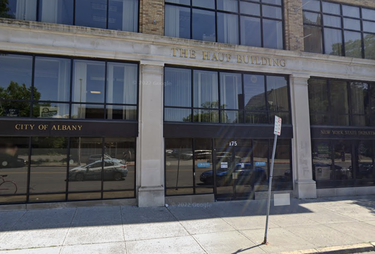County legislators push for more comprehensive notification requirements
— Photo from Google
The Hauf Building on Central Avenue in the city of Albany is home to the addiction-treatment center Camino Nuevo, which has generated significant controversy since opening its doors in 2015. Several county legislators were in opposition to a clause in a proposed local law that would allow facilities like Camino Nuevo to relocate within the same municipality without the County Department of Mental Health being required to notify local officials.
ALBANY COUNTY — A proposed bill that would require the Albany County Department of Mental Health to issue notifications about proposed mental health facilities under its purview doesn’t go far enough, in the eyes of several county legislators from both parties.
Currently, the Department of Mental Health is not required to give notice to county legislators or municipal boards about applications it receives from mental health facilities, such as addiction treatment centers.
Proposed Local Law A of 2024, which was introduced in February by Legislator Alison McLean Lane, of the 14th District, seeks to improve transparency around the siting of mental-health facilities by requiring the department to alert both the county legislator and the governing boards of any city, town, or village, where a facility wants to locate.
However, the bill exempts the department from issuing notifications when a facility proposes to relocate within the same municipality as its original site, which legislators in both the law and health committees took issue with last week.
“Some people call it a notification bill. I call it a dis-notification bill,” Legislator Paul Bergdorf, of the 23rd District, said at the April 25 Health Committee meeting. “Because if this law goes into effect with your exemption that [facilities] can move anywhere within the municipality without there being any notice … someone could remove [addiction treatment center] Camino Nuevo to Carolyn [McLaughlin]’s district and you would never be notified.”
The controversy around that particular center, which opened in 2015 and is located on Central Avenue in the city of Albany, lurked throughout the discussions at both meetings. As WAMC reported in February of last year, legislators, along with local officials and businesses, have been demanding that Camino Nuevo be relocated, citing safety concerns resulting from the high volume of patients that receive treatment there.
Legislator Merton Simpson, of the 2nd District, who is also the vice chairman of the Legislative Black Caucus, pointed out during the April 24 Law Committee meeting, “If we don’t have some kind of notification, then the inner city will be bombarded with these facilities, which we are already over-concentrated with.”
Legislator Mark Robinson, of the 4th District, reiterated those concerns to the Health Committee.
“Time and time in the past within my community is a conversation that, when it comes to drug treatment, it seems like they pick the poor ZIP codes for location,” Robinson said.
Albany County currently has around 34 treatment facilities, 28 of which are within the city of Albany, Bergdorf said.
Legislator Matthew Miller, of the 36th District, said that he felt a formal request for notification from the Department of Mental Health, as opposed to a legal requirement, would suffice.
“I think it’s superfluous for us to make a law telling our own departments to do what they should be doing [anyway],” he said.
Committee Chairman Raymond Joyce said that the committee’s primary concern should be “caring for those most in need, and those struggling with opioid addiction,” saying that opioid deaths had increased 17 percent over the past year.
“We need to have these facilities, so I think this would be a hindrance, this bill,” he said, explaining, “I just don’t know a location in Albany County where we’d want to put one of these facilities and not have people come out and say, ‘We’re totally opposed.’”
It was unclear why, precisely, the exemption was included, and McLean Lane, who was not at either of the committee meetings, did not respond to an Enterprise inquiry seeking that information.
However, Legislator Sean Ward, who was acting as her surrogate, learned at the Health meeting that McLean Lane would be willing to strike that exemption from the proposal, and so made that amendment.
However, the Health Committee still voted to release it without recommendation. The law will have to return to the Law Committee since it had not reviewed the version without that exemption.



